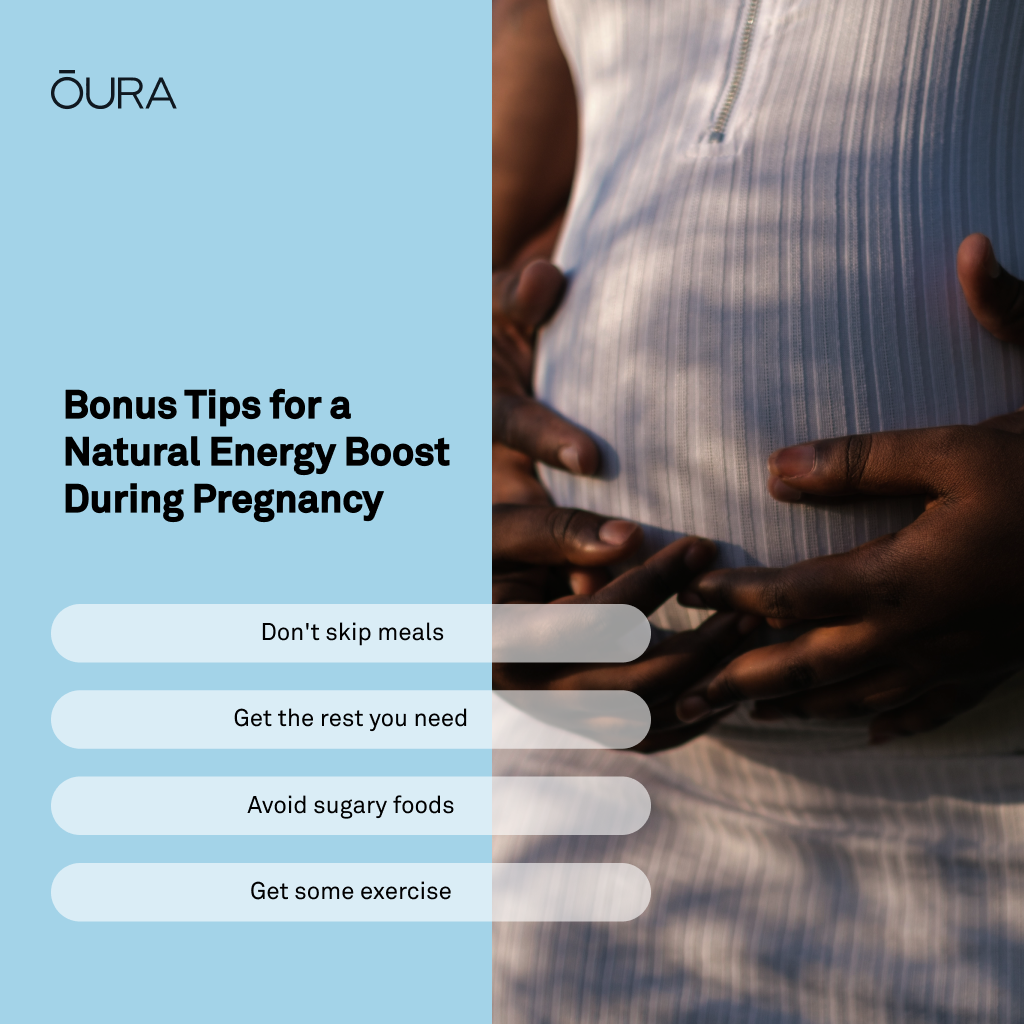You don’t have to go completely cold turkey on caffeine during pregnancy—but if you’re a coffee addict, you might be looking for some smarter swaps.
Whether you’re cutting back for your baby, your sleep, or just to keep the jitters at bay, these pregnancy-safe coffee alternatives have your back (and your energy).
| Member Tip: Follow your pregnancy on Oura and get helpful insights for each trimester with Pregnancy Insights. |
Should You Drink Coffee During Pregnancy?
Caffeine during pregnancy isn’t entirely off-limits, but moderation is key. Studies have shown that caffeine may reduce the blood supply to the fetus and hinder growth. One study found that drinking 400mg of caffeine per day could double the risk of miscarriage.
To stay on the safe side, the American College of Obstetricians and Gynecologists (ACOG) recommends that pregnant women limit caffeine intake up to 200mg of caffeine per day—roughly equivalent to one 12-ounce cup of coffee. It’s also worth remembering that caffeine is found in more than just coffee: tea, chocolate, energy drinks, and soda.
Even if you’re staying under the recommended limit, there are other reasons you might want to cut back:
- Sleep disruption: Caffeine blocks adenosine, the neurotransmitter that makes you feel sleepy, and may raise resting heart rate, making it harder to fall or stay asleep.
READ MORE: How Caffeine Impacts Your Sleep (& How Long It Really Stays in Your System)
- Increased anxiety or jitters: During pregnancy, your body metabolizes caffeine more slowly, which can amplify its effects and lead to feelings of restlessness or palpitations.
- Digestive sensitivity: Caffeine is a known gastrointestinal stimulant, which can aggravate heartburn—a common pregnancy symptom.
- Blood pressure spikes: If you’re already at risk for hypertension or preeclampsia, your provider may recommend limiting or avoiding caffeine altogether.
READ MORE: What Happens to Your Body During Pregnancy, According to Oura Member Data
Low or No-Caffeine Coffee Alternatives for Pregnancy
If you’re cutting back on caffeine during pregnancy, you’ve got more options than you might think. Below, these low- and no-caffeine alternatives can help you keep your morning ritual without the jitters—or the risk.
1. Decaf Coffee
Switching to decaf is one of the easiest ways to reduce your caffeine intake while still enjoying the flavor of coffee.
Just know that decaffeinated coffee still contains some caffeine—typically around 2 to 15mg per 8-ounce cup, depending on how it’s processed. That’s significantly less than regular coffee (which averages around 95mg per 8-ounce cup), but it still counts toward your daily limit.
| Member Tip: Curious if caffeine is affecting your sleep? Tag “Caffeine” in the Oura App to track its influence on your sleep quality. After doing this regularly, you may receive a Discovery with a breakdown of how exactly caffeine affects your biometrics and sleep. |
2. Tea
Traditional teas like green, black, white, and oolong all come from the Camellia sinensis plant and contain varying amounts of caffeine. For example:
- Black tea: ~47mg caffeine per 8 oz
- Green tea: ~25–35mg per 8 oz
- White tea: ~15–30mg per 8 oz
These teas can offer antioxidants and health benefits, but you’ll need to monitor your intake during pregnancy to stay under the 200mg daily caffeine limit recommended by ACOG.
3. Herbal Tea
Unlike traditional tea, herbal teas are made from herbs, flowers, roots, or fruits and are typically caffeine-free. However, not all herbal teas are safe during pregnancy, so it’s important to check with your healthcare provider before trying a new blend.
Generally considered safe in moderation:
- Peppermint: Can ease gas, bloating, and nausea
- Ginger: May help with nausea and digestion
- Cranberry: Often used for urinary tract support
- Rooibos: Rich in antioxidants and naturally caffeine-free, with low tannins that won’t interfere with iron absorption
Use caution with red raspberry leaf tea. While often recommended for uterine support in late pregnancy, research is limited, and it’s not advised in early pregnancy without medical supervision.

4. Alternative Lattes
If giving up your daily latte feels like a stretch, there are flavorful, pregnancy-friendly alternatives that still feel like a treat.
- Chai lattes are typically made with black tea, which contains caffeine. You can reduce or eliminate the caffeine by choosing caffeine-free chai blends made with just the spices—like cinnamon, cardamom, ginger, and cloves—steamed with milk or a dairy alternative.
- Turmeric lattes, also known as golden milk, contain curcumin, the active compound in turmeric known for its anti-inflammatory and antioxidant properties. (Turmeric moderation is still key—high supplemental doses may stimulate uterine contractions or interfere with hormone signaling.)
5. Water
One of the first signs of dehydration is fatigue, so if you’re struggling with energy, a glass of water is a good place to start.
Hydration is always important, but during pregnancy, it becomes essential. According to ACOG, you should aim for 8 to 12 cups (1.8 to 2.8 liters) of water daily to support increased blood volume, digestion, and amniotic fluid production.
If you struggle with plain water, infuse it with mint, citrus, cucumber, berries, or ginger to keep it fresh and enjoyable.
6. Matcha Tea
Matcha is a powdered form of green tea made from ground Camellia sinensis leaves. It’s considered safe in pregnancy because of its low caffeine content—roughly 35–50mg per gram. Because you consume the whole leaf, matcha tends to be higher in antioxidants than steeped green tea.
In moderation, matcha is generally considered safe during pregnancy. It’s rich in:
- Catechins, which help protect cells from oxidative stress
- Theanine, which may support relaxation without drowsiness
- Chlorophyll and polyphenols, which have antioxidant and anti-inflammatory effects that support optimal fetal development
7. Energy-Boosting Smoothies
Smoothies can be a nutrient-dense and energy-boosting caffeine replacement. A well-balanced smoothie delivers steady fuel without the crash that often follows a cup of coffee—especially when made with whole foods rich in fiber, healthy fats, and protein.
To support energy and blood sugar stability, try blending:
- Bananas or berries for natural carbohydrates and antioxidants
- Leafy greens (like spinach) for iron and folate
- Nut butter or chia seeds for sustained energy from healthy fats
- Greek yogurt or a protein powder for added satiety and muscle support
8. Hot Cocoa
If you’re craving something warm and cozy, hot cocoa can be a satisfying (and healthy) coffee alternative and only has a small amount of caffeine (about 12mg per tablespoon). Cocoa is abundant in nutrients like antioxidants (containing more than red wine and green tea!) magnesium, and flavonoids, naturally stimulating serotonin production to support mood, energy, and circulation. However, research suggests that it should be enjoyed in moderation in the third trimester, when excess polyphenols may affect fetal circulation.
Enjoy a classic hot cocoa by mixing unsweetened cocoa powder and warm milk or water, or upgrade to raw cacao powder, which is less processed and offers more nutritional benefits.
9. Kefir
Kefir is a great naturally energizing alternative to coffee—as long as it’s pasteurized. Unpasteurized dairy products are not recommended during pregnancy due to the risk of foodborne illness.
Kefir is a fermented milk drink that provides a combination of protein, probiotics, and B vitamins, which can help support sustained energy, digestion, and nutrient absorption. Its natural probiotic content also supports gut health, which plays a key role in immune function and overall well-being during pregnancy.
Some studies suggest that kefir may be linked to a reduced risk of preterm birth when consumed in early pregnancy, and may also help lower the risk of preeclampsia later on, though more research is needed to confirm these effects.
| Member Tip: Let Oura Meals unpack how well your choices are fueling you, so you can feel your best each day. Beat cravings and energy slumps, identify nutritional imbalances, and stay on track toward your goals. |
Bonus Tips for a Caffeine-Free Energy Boost During Pregnancy

It’s normal to feel more tired than usual during pregnancy. Pregnancy demands more from your body—but fortunately, the right habits can make a big difference in how you feel.
However, replacing your usual brew with one (or more) of the substitutes above isn’t the only way to boost your energy during pregnancy.
Here are four science-backed ways to naturally support your energy throughout the day:
- Fuel your body. Your energy needs increase during pregnancy, especially in the second and third trimesters. Skipping meals can lead to blood sugar dips and energy crashes. Instead, aim for regular, balanced meals with a mix of complex carbohydrates, protein, and healthy fats to support steady energy levels.
- Cut back on sugar. That mid-afternoon sweet treat might feel like a quick fix—but it often backfires. Foods high in added sugar can cause a rapid blood sugar spike followed by a crash, leaving you more tired than before. Focus on slow-burning snacks like a handful of nuts, Greek yogurt with berries, or hummus with veggie sticks.
LEARN MORE: Why Your Energy Crashes in the Afternoon (And 9 Ways to Fix it)
- Get the rest you need. Fatigue is common in pregnancy, especially in the first and third trimesters. Don’t fight it. Your body is working overtime, and getting enough sleep and rest is crucial for maintaining hormone balance, boosting immunity, and regulating energy levels.
| Member Tip: Naps longer than 15 minutes are automatically detected by Oura and contribute to your daily Sleep Score. During pregnancy, this provides a more comprehensive view of your daily rest. |
- Move your body. Light to moderate exercise—like walking, stretching, or prenatal yoga—can improve circulation, reduce fatigue, and boost mood-enhancing endorphins. Just 10–20 minutes of movement can help combat stress and shift your energy.
Coffee Alternatives for Pregnancy: The Bottom Line
Pregnancy often brings about significant changes—including changes to your caffeine habits. But reducing your caffeine intake doesn’t mean giving up your morning ritual. From matcha to hot cocoa to nutrient-packed smoothies, there are plenty of safe and satisfying coffee alternatives to enjoy during pregnancy. The key is finding what works for your body, supports your energy naturally, and keeps both you and your baby feeling your best.
RELATED: How These Women Are Using Oura as a Guide During Pregnancy & Motherhood






